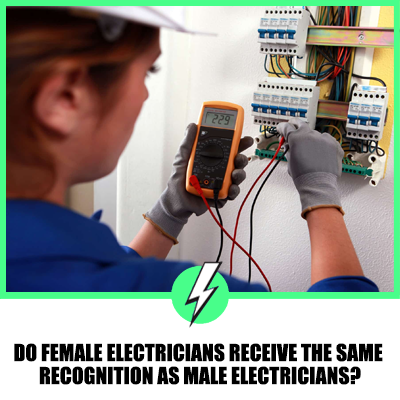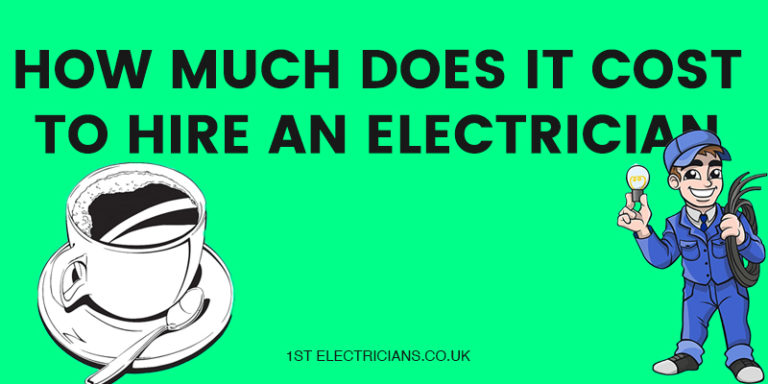Do Female Electricians Receive The Same Recognition As Male Electricians?
Is becoming an electrician worthwhile for a female? Is the job of an electrician too physically demanding for females?
An electrician is a good career choice for a woman who wants to work in a well-paying field. Out of all the building trades, becoming an electrician requires the least amount of physicality to do the job, making being an electrician an ideal career for a female.

Contents
What percentage of electricians are female in the UK?
1%, it is astounding as there are an estimated 250 thousand electricians in the UK, and only 2000 are females.
However, the trades have always been considered the male domain as so many other jobs in the industry. Still, the truth is females are breaking the glass ceiling of trades and becoming as good and maybe better than their male counterparts at performing the job.
There are still hurdles to overcome before more females join the profession bridging the gender gap and ousting the perception of laddish behaviour in the industry.
Perceived hurdles to becoming a female electrician
The perception that an electrician is challenging and physically demanding is only partially accurate compared to other trades. The role of the electrician is relatively light when it comes to the need for bulging muscles.
The laddish behaviour of younger onsite workers is somewhat of a stereotype, and the industry and society had changed tremendously since the 80s when wolf whistles were commonplace.
What qualifications do females need to be an electrician?
The qualification is the same for people training to become an electrician across the industry. The qualifications differ slightly depending on which sector you have chosen for your electrical career.
If you are not choosing to work in a heavy industry or with high voltages, you will inevitably take the domestic installer route for your training.
The two routes available for training are the traditional apprenticeship, where a company pays you to train while you work. This is typically taken by school leavers and some young folks in their late twenties.
The second option is to train at a recognised training centre. Both types of training will culminate in an NVQ Level 3 diploma, making you a fully qualified electrician.
Is it hard to be an electrician as a woman?
No, the average woman can perform the necessary tasks the same as a male electrician and do the tasks well.
There is a huge demand for electricians, and companies will snap up female electricians as they can be preferred by some clients and never rejected by any clients.
As a qualified female electrician, you will have an apprentice assigned to you, possibly male or female, and they will take some of the more mundane workloads under your supervision.
Can a female electrician become self-employed in the UK?
Once you are qualified, you can do what you wish. There are no constraints on any electrical activities you perform (you need specific accreditations), and you can work for yourself if that’s the route you want to take.
Becoming self-employed is ideal for the female electrician. You can increase your earning potential and even employ other electricians and earn from their services.
If you have a family, being self-employed would provide the freedom needed at certain times with a young family.
However, remember that the onus of being current in the industry is on the electrician once they have become qualified. Electrical Rules and laws change all the time so keep up to speed.
Are the risks of being an electrician acceptable to a female?
The risks are minimal and should not be considered when becoming an electrician, regardless of gender.
Yes, there are fatalities in the electrical industry but not as many as you may think. More electricians are injured from falls than electrocution.
Training to become an electrician covers a lot of health and safety for an excellent reason, so you can be aware of the dangers of working with electricity.
Training standards are very high in the UK, which helps to keep accidents to a minimum.
Is being an electrician a good career for a woman?
Yes, electricians are in demand, and there is a lot of work for males and females. The work is not heavy like other trades, and the pay is higher than in other trades.
The route to self-employment is relatively easy, and residential clients often prefer females.
What qualifications do you need to apply to become an electrician?
From school, you will be required to have 5 GCSEs, including maths and English, with the lowest grade being a C.
If you are not seeking an apprenticeship and wish to retrain, you will be required to do some brief tests to check you have the aptitude to become an electrician.
Courses at training centres can be covered by grants from the government but check first as things change fast.
How much will a female electrician earn when qualified?
Qualified electricians earn a solid salary, making being an electrician a reasonable proposition.
The fully qualified electrician with a Part P accreditation can earn 50 k per annum. Self-employed electricians are somewhat in control of their destiny and can earn substantially more if prepared to put the hours in.
Out of all the trades, electricians are the highest paid and work a standard 40 hours a week.
Why are there not more female electricians in the UK?
Misconception about tradespeople would be a natural assumption. Things are changing, and the NICEIC actively encourages females to join the profession and become qualified electricians.
There are reports of some younger qualified females earning so much that when they meet the VAT threshold of 85K, they stop working and travel for three months every year.
What other profession could you possibly do this?
The barriers are falling, and more women will be trained as electricians in the coming years.





